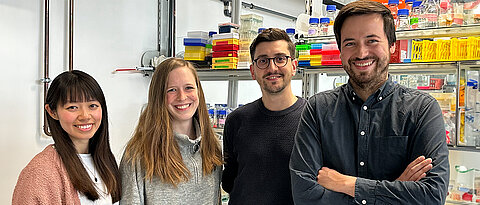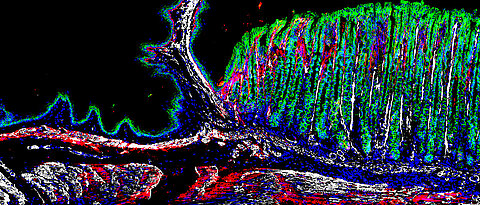
Light pollution is more serious than expected: Moths not only lose their orientation directly under street lamps. Their flight behaviour is also disturbed outside the cone of light.
more
Light pollution is more serious than expected: Moths not only lose their orientation directly under street lamps. Their flight behaviour is also disturbed outside the cone of light.
more
Plants can extract even the smallest traces of the important nutrient potassium from the soil. A team led by Würzburg biophysicist Rainer Hedrich describes how they achieve this in ‘Nature Communications’.
more
Genome instability can cause numerous diseases. Cells have effective DNA repair mechanisms at their disposal. A research team at the University of Würzburg has now gained new insights into the DNA damage response.
more
Dangerous mixtures: pesticides in combination can have unexpected effects on the development of honeybees. This is shown by a new study from the Biocenter.
more
Numerous studies have shown that the older the father, the higher the risk of disease for the offspring. Human geneticists at the University of Würzburg have now taken a closer look at the processes responsible for this.
more
At the University of Würzburg (JMU), Dimitrios Papadopoulos is investigating RNA-based mechanisms maintaining aggressive pediatric tumors. He has now been awarded one of Europe's most coveted fellowships for young scientists.
more
It's not just us humans who suffer from heatwaves. Researchers at the University of Würzburg discovered that hot temperatures rob bumblebees of their sense of smell – and makes them struggle when searching for food.
more
Researchers from Würzburg and Berlin present a new molecule for visualising the sphingomyelin metabolism. This offers prospects for innovative therapeutic approaches in infection research.
more
Chlamydiae are sexually transmitted pathogens that can apparently survive in the human gut for a long time. Researchers from Würzburg and Berlin report this in the journal PLOS Pathogens.
more
An international research team has sequenced the largest genomes of all animals – those of lungfish. The data will help to find out how the ancestors of land vertebrates managed to conquer the mainland.
more
In an emergency, ants bite off injured limbs of fellow ants to ensure their survival. Whether they take this radical step depends on the location of the wound.
more
The University of Würzburg is part of a new Collaborative Research Centre (CRC) in which innovative therapeutic strategies against cancer are being sought. Another CRC with Würzburg participation will be extended.
more
Christian Hof is head of the new Chair of Global Change Ecology at the University of Würzburg. His research focuses on how climate change and human activities affect species and biodiversity.
more
Researchers at the University of Würzburg have discovered a new function of the oncoprotein MYCN: It not only helps cancer cells to grow stronger, but also makes them more resistant to drugs.
more
The transition from the esophagus to the stomach is a delicate region from a medical point of view, often associated with pathological disorders leading to cancer. An international research team has now gained new insights into this region. These pave the way for new prevention and treatment options.
more